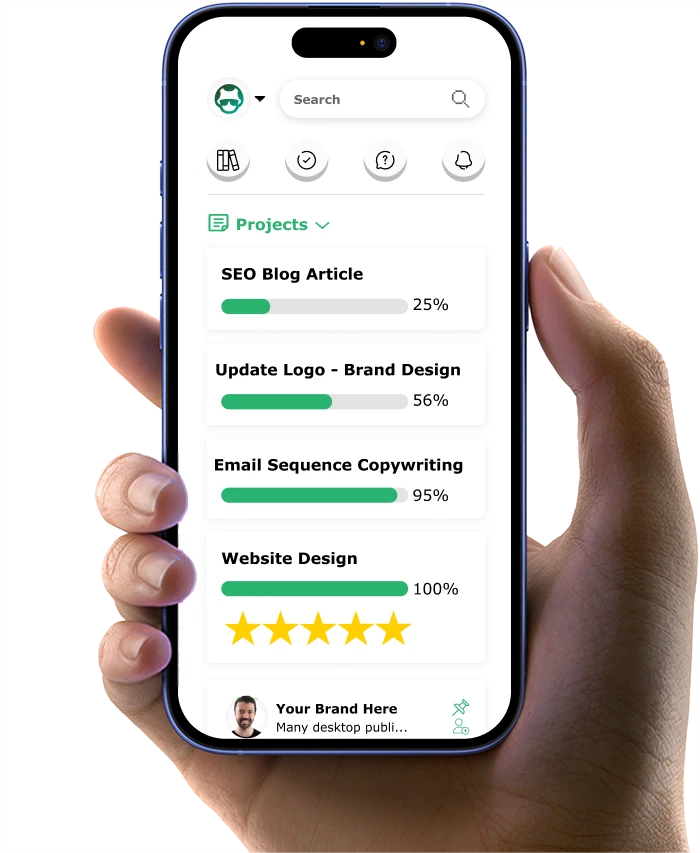How to Write Sales Copy... That ACTUALLY Sells!

What is the difference between good copy and bad copy?
Simple.
Good copy will bring you sales! And that's what every business ultimately wants, right?
Jon knew this back in 2015 when he first launched his startup for online electronics. His products were AWESOME! But, his sales? Not so great. That’s until he discovered the power of storytelling, or more specifically, copywriting!
To learn how to write copy that sales, of course you need passion, but you also need the drive and determination to see things through, without throwing in the hypothetical towel.
Why?
If you step away and analyze your business, you will realize that the majority of your sales happened thanks to compelling copy.
With compelling copy, you can:
- Create a long-lasting bond with your audience
- Transform products into must-haves
- Separate yourself from your main competitors
Want to see how Jon and millions of others are using sales copy to create momentum for their business? Keep reading for these 17 tips!
In a rush? Want to download this article as a PDF so you can easily take action on it later? Click here to download this article as a PDF guide.
The (Almost) Science Behind Profitable Sales Copy
This may sound cliche' but things are pretty black and white when it comes to creating fantastic copy—you’re either good at it and your copy sells, or you’re not. And if you’re not writing compelling sales copy, you’re wasting time and money!
Here’s the thing — persuasive copy requires many things, such as:
- Writing skills
- Knowledge
- Patience
- Passion
- Research
- Empathy
However, the good news is that if you follow some simple tips and do everything in your power to boost your copywriting, you can actually achieve excellent results in the long run!
Here are 17 tips to get started on your journey to producing killer copy that gets sales every time!
Tip #1 for Writing Compelling Copy: Get to Know Your Audience
Did you know that 80% of readers never read past the headline? This is why effective copywriting is vital for generating traffic! Sales copy aims to influence action — sell, download, or click!

Before you can create great copy that sells a product or service, you must understand your audience implicitly.
In other words, who are you writing for?
Asking yourself a few questions will significantly change the way in which you present the content:
- Are you writing copy directed at technical professionals?
- Are you selling parents on a service or toys for their children?
Figuring out who your target audience really is will help you market to them more effectively.
After all, a good start-up idea with a great product or service goes nowhere without engaged leads who convert into paying customers.
Tip #2 for Writing Compelling Copy: Determine Your Goals Before Writing
Clearly, your objective is to sell something. But what are you trying to get across in this copy?
- What are you trying to achieve?
- Are you introducing customers to a new business?
- How will the copy help buyers understand your needs or those of your business?
- Are you speaking about upcoming sales or promotions?
Before you start writing any copy, take a few minutes to jot down your objectives.
Tip #3 for Writing Compelling Copy: Create Subject Lines Subscribers Will Love
Writing an email or text message requires crafting a compelling subject line. Without it, those messages are often overlooked by everyone who reads them.
To lure in your readers, craft your invitation so the reader can see “what’s in it for them” right from the start. There are many types of subject-line styles that you can employ when writing a headline for your email. You could:
- Choose a list. “13 Reasons to Choose Us for Your Next Design Project”
- Ask a question. “What’s Your Favorite Summer Activity? Here’s A Few to Try!”
- Compare two points. “Target Audiences vs. Target Markets: Differences to Know for Your Next Campaign”
Regardless of which style you select, make sure your headline is concise (usually up to 60 characters) and compelling so people will read the message in full!
Tip #4 for Writing Compelling Copy: Use the Power of Storytelling
Businesses that rely heavily on copy to connect with their customers need a compelling narrative in order to become and remain successful.
But how do you know what the right narrative is for your business? You tell stories!
Start at the beginning and paint a picture of how your product or service came to be. Then see where that takes you. With your original story, you can engage and build trust with prospective customers.
You can incorporate many elements to create a compelling story in your copy, including:
- Customer reviews
- Recent rewards
- Past startup issues
Find stories that help articulate your:
- Values: How can you use those stories to show the values and beliefs of your product?
- Solutions: Are the stories you’re using showing the solution your products/services can bring customers?
- Pain Points: Have you used customer testimonials, to show others that you relate to their issues... and can fix them?
Become an effective storyteller, and you'll not only take your copywriting process to a whole new level, but you’ll also get the sales!
Tip #5 for Writing Compelling Copy: Use a Relatable Tone
How you implement tone in your writing will affect how your message is received by the audience and also how successful the message will be.
Speak in a humble way so that readers can relate to you. And above all, avoid trying to sound smart. Show them your business knows what it’s doing through stories rather than simply saying so.
Write so that you create real value for the reader and do it in a way that makes the reader feel comfortable.
By being honest and welcoming, your customers will form a connection with you. Consumers want to buy from someone who understands their struggles and will offer them insight on how to solve their problems.
Tip #6 for Writing Compelling Copy: Get to the Point with Short and Concise Sentences
Yes, you read that right!
Use short sentences and paragraphs to better capture the attention of your customers as they scan through your sales copy.
The average attention span, according to a survey by Microsoft, is 8 seconds.
The survey also found that if customers are distracted during the first 6-8 seconds the chances that they will continue reading your copy is greatly minimized.
If you can capture the reader’s attention in the first 8 seconds and keep them interested, they are likely to keep reading!
Tip #7 for Writing Compelling Copy: Include Enticing Bullet Points
The best way to highlight the benefits of your product or service in your sales copy is by using bullet points.
By using bullet points, you will subconsciously tell the reader that something is important, which will intrigue them and keep their attention.
In any form of copy, you can use bullets for the following:
- A list of problems your product or service solves.
- Pain points or a list of problems your products or service solves
- Product benefits
- Service details
- Customer testimonials
- Details of a warranty or guarantee
They help break up long chunks of text and can come after headings or subheadings, in order to make them easier for readers to take in.
Tip #8 for Writing Compelling Copy: Show the Reader You Feel and Understand Their Pain Points
Short, focused, and compelling sales copy is key.
You want to create a situation where the reader feels that you truly understand his or her problem. And then, of course, the reader should be confident that you can solve that problem with your product or service.
By emphasizing the pain points, you can make your readers feel that very pain so strongly that they are now craving a solution, immediately!
With compelling copy, readers will naturally see how your product or service can help solve all of their problems. And they’ll be more likely to buy.
Tip #9 for Writing Compelling Copy: Apply “FOMO” Tactics
FOMO is used to describe a person's fear of missing out on something — like an amazing new deal on a service your customers can benefit from!
Humans have a natural desire to participate in fun new activities, events or products. That need is stronger than ever because of the nature of social media.
Did you know that 56% of social media users experience the feeling of FOMO, and most are millennials? 79% of Millennials experience FOMO on a daily basis, if not hourly.
How can you use FOMO to your advantage?
- Get customers to say 'yes' by telling them that you've hand-picked them for your offer. This way, they'll feel like they are very special and important. People love feeling important!
- Make your offer date sensitive by creating a social media contest. When they see that there’s an end in sight, it will prompt customers to take action!
Tip #10 for Writing Compelling Copy: Avoid Passive Voice
Compelling copy uses active voice rather than passive voice to make your copy more interesting and exciting!
What's wrong with using passive voice? Nothing is inherently wrong with using passive voice in your sales copy... BUT it matters if you want to learn how to write copy that sales!
When you learn how to write sales copy in an active voice, the subject of the sentence performs the action. In copy written in the passive voice, the subject receives the action.
Active voice:
Our latest product releases today!
Passive voice:
The product will be released by us, today!
Oftentimes, passive voice lacks the depth and distinction that active voice provides.
For example, instead of saying "last week, a great review was written by our client," you should say "our client wrote us a great review last week."
Tip #11 for Writing Compelling Copy: Trigger Urgency in Your Copy
If you're serious about creating great copy that sells, you need an impending deadline. You need to create some type of event that your pitch will hinge upon. What's that event?
The power of storytelling, or the text in your email subject lines and body copy are already key factors for driving engagement- but you also need a deadline to get them to act!
When you use a deadline, the reader feels some gentle pressure. They realize they need to take action (to avoid FOMO!). 24-hour deals, or holiday season sales, like Black Friday are perfect examples.
Countdown clocks add an extra sense of urgency and can convince buyers they may not have enough time to take advantage of a deal, so they better act now!
Tip #12 for Writing Compelling Copy: Deliver Error-free Copy
Use a grammar checker before you publish anything.
One error here or there might not create major damage. But if your copy is full of errors, your business appears unprofessional. And that means you’ll turn off potential customers.
Not only will simple spelling, grammar, or formatting errors turn customers or readers away from your content, but those mistakes can limit your ability to reach your audience because search engines don’t like mistakes.
Tip #13 for Writing Compelling Copy: Focus on Benefits – Not Features
When you’re selling a product or service, focus on the benefits the consumer will experience rather than the features of your product or service.
For example, if you sell cleaning services, talk about how quick and convenient you are for any occasion including party cleanup, homes and apartments, instead of focusing on your cleaning services, like sanitizing services, mopping and sweeping or products your cleaning team uses.
Although explaining how a product works and what it does is important in digital marketing, this is often less interesting to buyers. They will be more engaged if they can quickly identify the benefits they will enjoy by making a purchase.
Tip #14 for Writing Compelling Copy: Test Your Copy with A/B Testing
To create compelling copy, A/B testing trials will give you the best chance to convert leads into sales.
What is A/B testing?
Test two variations of the copy (usually A and B testing) to see which works better for getting the results you want. You can change up the copy, then test again until you find what generates more interest from your visitors!

If such a small change in your copywriting can affect the number of leads who click on your site and its other metrics, you'll want to know what other factors might have this same effect.
Understanding your audience is essential to creating effective copy. And A/B testing helps you do exactly that.
Tip #15 for Writing Compelling Copy: Prove Your Business Is Tried and True
For many customers, social proof is necessary before they buy a product.
What exactly is social proof?
Social proof is a powerful form of marketing that is based on social psychology. Social proof is believing that customers are more likely to take action if there are many others doing it too.
Consumers find reviews to be 12X more trustworthy than the company's own description of their products.
When potential customers see that former customers trust you and had a good experience with your product or service, it broadens the trust in your brand.
It's often said that no one gets a second chance to make a first impression. But as we see more and more today, your first encounter with a person might not happen until they read a review of you on the internet without ever coming into contact with you at all.
A consumer's purchase decisions are often made through reviews before they've ever seen the product in person.
After reading enough reviews about a product, consumers feel like the experience has been personalized to them.
Customers are drawn to well known services and products from businesses, and social proof could convince them to buy from you just like it did with other customers.
Tip #16 for Writing Compelling Copy: Create an Emotionally Appealing Copy
If you tap into emotions in your copy, your words have more power to influence readers. Of course, the trick is to learn how to write sales copy that customers can relate to.
When your copy doesn’t resonate with your audience, your copy can come off as offensive, melodramatic, or simply unrelatable.
Copy is much more effective when you appeal to the emotional side of things. Think about those commercials that make you laugh (or cry), like Dove’s Campaign for Real Beauty, featuring women of all shapes and sizes who have come together to celebrate each other's uniqueness!
If you tap into the reader’s emotions with vivid copy, your words suddenly have more power. Power to engage and influence your readers.
The trick, of course, is writing emotional copy that resonates.
Tip #17 for Writing Compelling Copy: End with a Clear, Compelling Call to Action
Establishing trust for the customer is important. But you've got to ask for their business at some point — that’s why your copy should always have a clear call-to-action!
Sales copy must always have a goal.
What is your end goal? Do you want the reader to...:
- Buy a product
- Sign up for email communications
- Download your content offer
- Simply begin interacting with your business
None of this can happen without an actionable instruction for the reader, also known as a call to action or CTA.
For example:
- “Download our [content offer] now”
- “Schedule a free consultation”
- “Learn more about [product/service]”
Once your lead has expressed interest, they'll need direction. Your ultimate goal in sales copy is to give prospects a clear course of action. This is where the sales conversion begins.
Conclusion
Download the “How to Write Sales Copy... That ACTUALLY Sells! ” so you won’t forget to take action on it later. Click here to download it now.
Learning how to write copy that sales is just one part of an efficient marketing campaign, but it's an effective way to reach your sales goals quickly!
Sometimes it’s hard to know where to start when you want to create a marketing campaign, but one of the best places is by tightening up your copywriting skills.
If your end goal is conversion or getting customers on board with an idea, then designing compelling copy will get you there quickly!
We went ahead and created 17 ways for you to learn how to write sales copy (and get more sales) so hopefully this blog post has been helpful.
Do you use any of these copywriting tactics? What’s something you think you can do better when creating sales copy?
Let me know in the comments below.
Keep Growin’, and stay focused.
Mirakle













